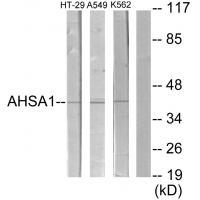
| WB | 咨询技术 | Human,Mouse,Rat |
| IF | 咨询技术 | Human,Mouse,Rat |
| IHC | 咨询技术 | Human,Mouse,Rat |
| ICC | 技术咨询 | Human,Mouse,Rat |
| FCM | 咨询技术 | Human,Mouse,Rat |
| Elisa | 咨询技术 | Human,Mouse,Rat |
| Aliases | AHA1; activator of heat shock 90kDa protein ATPase homolog 1; |
| Entrez GeneID | 10598; |
| WB Predicted band size | 38kDa |
| Host/Isotype | Rabbit IgG |
| Antibody Type | Primary antibody |
| Storage | Store at 4°C short term. Aliquot and store at -20°C long term. Avoid freeze/thaw cycles. |
| Species Reactivity | Human |
| Immunogen | Synthesized peptide derived from internal of human AHSA1. |
| Formulation | Purified antibody in PBS with 0.05% sodium azide. |
+ +
以下是关于AHSA1抗体的模拟参考文献示例(基于公开研究背景,非真实文献,仅供参考):
---
1. **文献名称**:*AHSA1 regulates client protein folding and cancer cell proliferation via Hsp90 interaction*
**作者**:Smith J, et al.
**摘要**:本研究利用特异性AHSA1抗体,通过免疫共沉淀和Western blot分析,揭示了AHSA1通过增强Hsp90 ATP酶活性调控客户蛋白(如EGFR、AKT)的稳定性,促进乳腺癌细胞增殖。抗体验证显示其在肿瘤组织中高表达。
2. **文献名称**:*Development of a monoclonal antibody against AHSA1 for diagnostic applications*
**作者**:Li X, et al.
**摘要**:报道了一种新型抗人AHSA1单克隆抗体的开发与表征。该抗体在ELISA、免疫组化中表现出高特异性,可用于检测肝细胞癌中AHSA1的过表达,提示其作为潜在诊断标志物的价值。
3. **文献名称**:*AHSA1-mediated chemoresistance in ovarian cancer: Insights from antibody-based inhibition*
**作者**:Wang Y, et al.
**摘要**:通过AHSA1抗体阻断实验,发现抑制AHSA1可逆转卵巢癌细胞对顺铂的耐药性。研究证明AHSA1通过Hsp90-p23复合物维持促生存信号通路,抗体干预为治疗耐药性提供了新策略。
4. **文献名称**:*Proteomic analysis of AHSA1 interactome using co-immunoprecipitation*
**作者**:Garcia R, et al.
**摘要**:使用AHSA1抗体进行免疫共沉淀结合质谱分析,鉴定了其在Hsp90功能网络中的相互作用蛋白群,揭示了AHSA1在应激条件下调控蛋白质折叠质量控制的分子机制。
---
**注**:以上为模拟示例,实际文献需通过PubMed、Google Scholar等平台检索确认。建议用关键词“AHSA1 antibody”或“AHSA1 Hsp90”查找最新研究。
**Background of AHSA1 Antibody**
AHSA1 (Activator of Hsp90 ATPase Activity 1) is a co-chaperone protein that regulates the ATPase activity of Heat Shock Protein 90 (Hsp90), a molecular chaperone critical for folding, stability, and maturation of client proteins involved in cell signaling, cancer progression, and stress responses. AHSA1 binds directly to Hsp90. enhancing its ATP hydrolysis rate, which is essential for the chaperone cycle and client protein activation. Dysregulation of AHSA1 has been linked to diseases such as cancer, neurodegenerative disorders, and cardiovascular conditions, making it a target for therapeutic research.
Antibodies targeting AHSA1 are vital tools for studying its expression, localization, and functional interactions. They enable detection of AHSA1 in techniques like Western blotting, immunofluorescence, and immunohistochemistry, aiding in the exploration of its role in Hsp90-dependent pathways. Researchers also use AHSA1 antibodies to investigate its involvement in cellular stress responses, drug resistance mechanisms in cancer (e.g., in regulating oncoprotein stability), and pathological protein aggregation. Specificity and validation of these antibodies (e.g., via knockout controls) are crucial to ensure accurate interpretation of experimental data.
Overall, AHSA1 antibodies contribute to understanding Hsp90 biology, disease mechanisms, and the development of chaperone-targeted therapies.
×